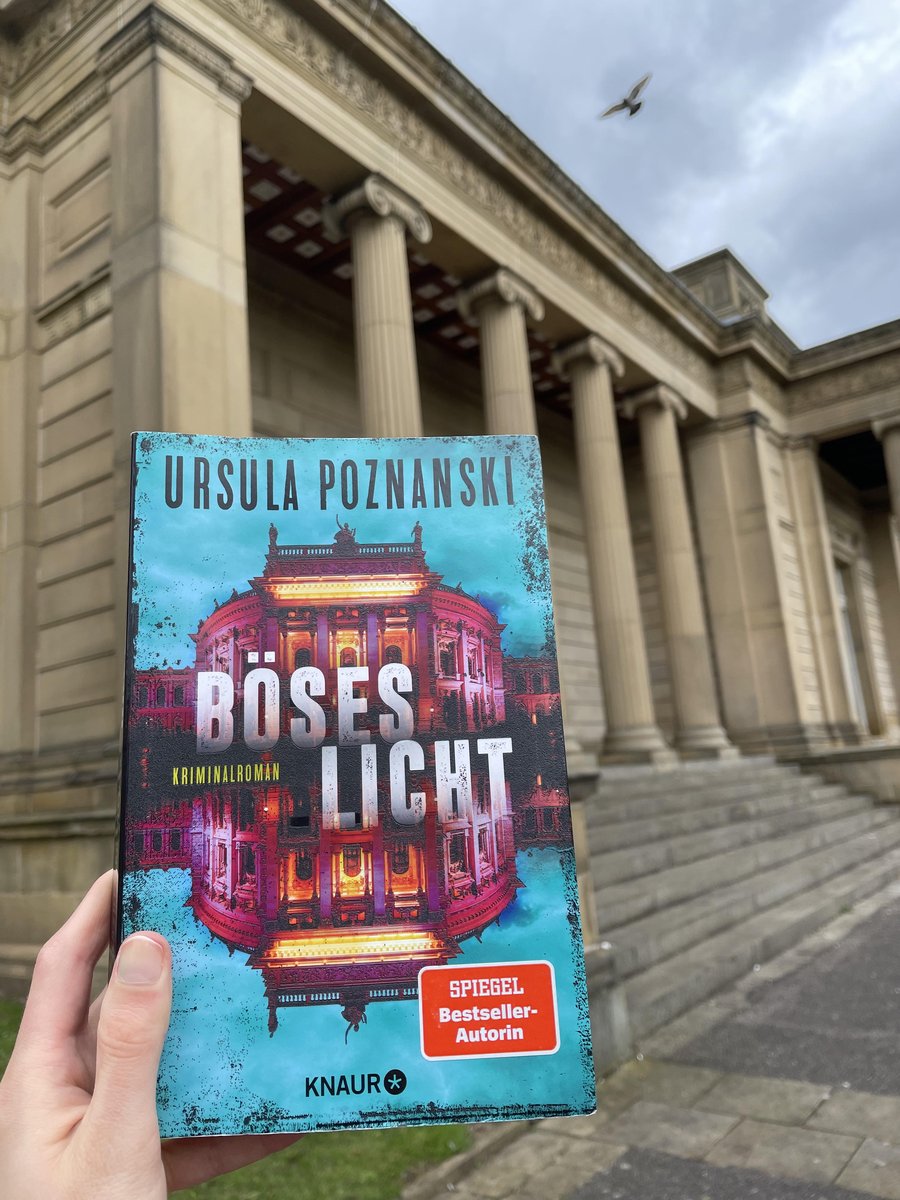Ursula Poznanski’s 2023 novel Böses Licht (“Evil light”) is the second in a series of crime thrillers – the first being her 2022 novel Stille Blutet (“Silence Bleeds”) – which follow the crime cases investigated by the young female police detective, Fina Plank, and her team from Vienna.
This second novel opens in the Burgtheater of Vienna during the climax of Shakespeare’s Richard III. The actors of the tragedy are literally dripping with artificial blood, so hardly anyone in the audience notices the real corpse on stage. Ulrich Schreiber, a veteran dresser, is driven from the bowls of the theatre into the limelight, dead and sitting on a throne. The crime evokes horror and perplexity in equal measure: Schreiber was universally popular, an inconspicuous man, a man without enemies. The reader is invited to follow detective Fina Plank and her colleagues as they dive into the world of the theatre in an attempt to find out the truth behind the murder. Yet this is a world of dazzling and complicated personalities, a world where reality is buried under carefully constructed appearances. And it’s not long before Ulrich Schreiber’s death is followed by two more bloody murders on the theatre scene.
“Evil Light” is a typical thriller in many aspects; full of twists and turns, the novel will keep you guessing until the end. However, Poznanski’s choice to set her thriller within the Austrian theatre scene also enables her to weave contemporary political and social issues into the plotline. One of the many fascinating characters of the novel is Aurora, a young actress who boldly attempts to assert herself in the male dominated world of the theatre. Nevertheless, thoroughly dependent on the older, established and successful actor Freysam to kickstart her career, she finds herself reduced to a sexual object, a mere paparazzi tool and plaything. Coupled with subtle references to the MeToo campaign, Poznanski delivers a scathing critique of the theatrical world and its refusal to acknowledge the sexual harassment that still goes on behind the scenes; we are sharply reminded of just how deep patriarchal structures run within the world of fame and fortune.
Moreover, despite having read many of Poznanski’s novels, I was once again surprised at the originality, liveliness and dynamic nature of her characters. Poznanski makes it her mission to subvert stereotypes; the protagonist detective Fina Plank, for example, is anything other than your conventional female police officer. Young and short in stature, Fina, much like Aurora, must strive daily to assert herself in a male dominated profession. Yet, unlike Aurora, Fina refuses to buckle under the pressure; she uses her wit to assert herself and soon becomes the driving force of the investigation, developing an inspiring newfound confidence and independence along the way.
Poznanski also engages perceptively with social media, exploring both the corruption and amount of power social media holds in our modern world, especially when it comes to the private lives of celebrities. Through the eccentric character of Gabriele Epple – an obsessive fangirl of the world famous actor Freysam – Poznanski demonstrates the dark side of so-called “fandoms”, revealing just how close the line between obsessive and depressive truly is. I found Poznanski’s engagement with such current social and political issues a refreshing and innovative way to approach and deepen the crime thriller genre.
While the two novels in the series follow Plank’s team as they tackle two separate and seemingly unrelated cases, a mysterious first person narrative is woven into both texts. The unknown player gives their proverbial two cents on everything, watching the action unfold from the sidelines. Who this person is and what their purpose is remains ambiguous and their remarks, full of cryptic hints, are not always comprehensible. The offscreen voice constantly addresses an unknown listener in the third person, a narrative device that skilfully draws the reader in as an accomplice, forcing us to enter the mind of a murderous psychopath and constantly keeping us on our toes. Thus, while “Evil Light” can be read as a stand-alone text, I would recommend reading “Silence Bleeds” beforehand. It will be interesting to see whether this mysterious character will make another, perhaps bolder, appearance in the next thriller of the series and whether their purpose will finally be revealed…
To summarise, “Evil Light” is a crime thriller with a plotline that will keep you on the edge of your seat and whose writing style – gripping, witty and lively – will keep you turning the page...
Review by Rachael Norman
This review was written for the ACF London's EXPLORE OUR LIBRARY initiative.

